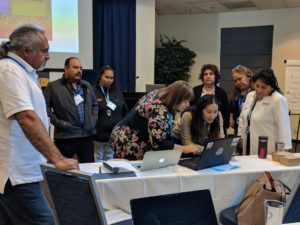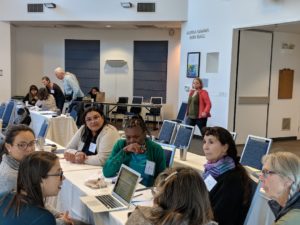There’s an old call-and-response chant I’ve heard at many demonstrations, rallies, and picket lines over the years: “Who’s got the power? We’ve got the power. What kind of power? People Power.”

Grassroots Convening participants practice crafting resonant messages for the 2020 elections, photo credit: Aviva Kardener, Rose Foundation for Communities and the Environment
This was echoing through my head after Resource Media Managing Director Jenny Park and I co-led a media training in October for a visionary group of grassroots environmental justice organizations from across California. Convened by the Rose Foundation for Communities and the Environment and the California Wildlands Grassroots Fund, the daylong intensive at UC Davis featured workshops designed to give grassroots groups the tools they need to leverage the 2020 elections to advance their respective advocacy work.
In our workshop, Jenny and I focused on building blocks of media and digital communications strategy that will help groups leverage the public attention around the 2020 races to advance their own equity and environmental agendas.
We discussed the opportunities for grassroots organizations to “inject” their perspectives on environmental and social justice into the existing public conversations about the elections and to recruit new supporters who are paying attention to the elections. We reviewed tactics such as using popular hashtags like #ActOnClimate to craft resonant messages for social media, and pitching journalists with media advisories, press releases and best-practice media relations. We also covered how grassroots advocates within 501(c3) organizations can encourage candidates to support their issues.
We also discussed the criteria that can make an environmental message or story newsworthy to ever-busier journalists like teasing out controversy, colorful human stories, new facts, or timely decision points. For a grassroots organization like the Mare Island Heritage Trust, this means organizing press conferences and inviting local newspapers and TV affiliates to shine a spotlight on the city of Vallejo’s sudden closure of a San Francisco Bay nature preserve and negotiations with developers.
As candidates look to define themselves and appeal to voters, we discussed how community groups have an opportunity to connect global issues like the climate crisis (a major issue in the 2020 presidential election!) to local solutions like clean energy production, water protection and sustainable agriculture. For example, Three Sisters Gardens, a network of organic vegetable farms near Sacramento run by youth formerly involved in the criminal justice system, has been using Facebook to connect to a larger narrative around #foodjustice and shore up support from leaders in the state capitol region.

2019 Grassroots Convening participants practice Tweeting for #2020; photo credit: Aviva Kardener, Rose Foundation for Communities and the Environment
Of course, there is a paradox in that while elections bring massive public attention to social issues, they can also create “ballot fatigue” for people on the receiving end of blaring newspaper headlines, television pundits, and social media feeds. In order for grassroots community organizations to make their voices heard in this noisy context, we practiced crafting pithy, concise, and persuasive messages communicating the vision of a more just, sustainable, and equitable world.
With an exercise in crafting 280-character Tweets, participants got creative in finding ways to connect their messages about equity, sustainability, and clean water, air, and lands in California, to a theoretical local election.
It was amazing to see the clever and visionary approaches—in English and Spanish!—created by representatives of groups as varied as the Butte Environmental Council, the Center on Race Poverty & the Environment and the Benicia Tree Foundation.
We’d like to extend a big, heartfelt thanks to the Rose Foundation for giving Resource Media this opportunity to help its grantees prepare to share their stories effectively using the news media and social media in 2020. The gathering was an inspiring reminder that with the right tools and strategy, we, the people do have the power to create a better world.
